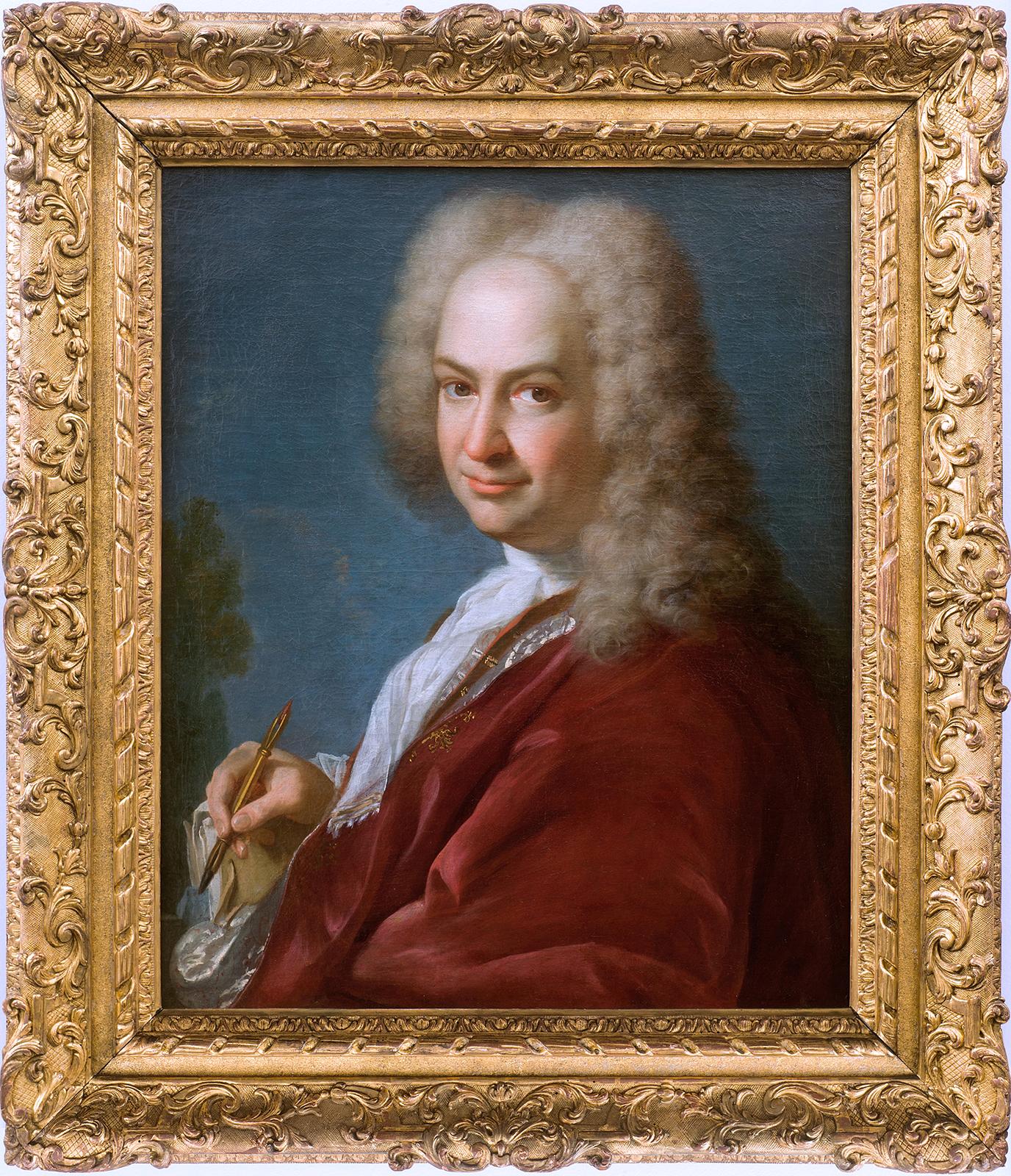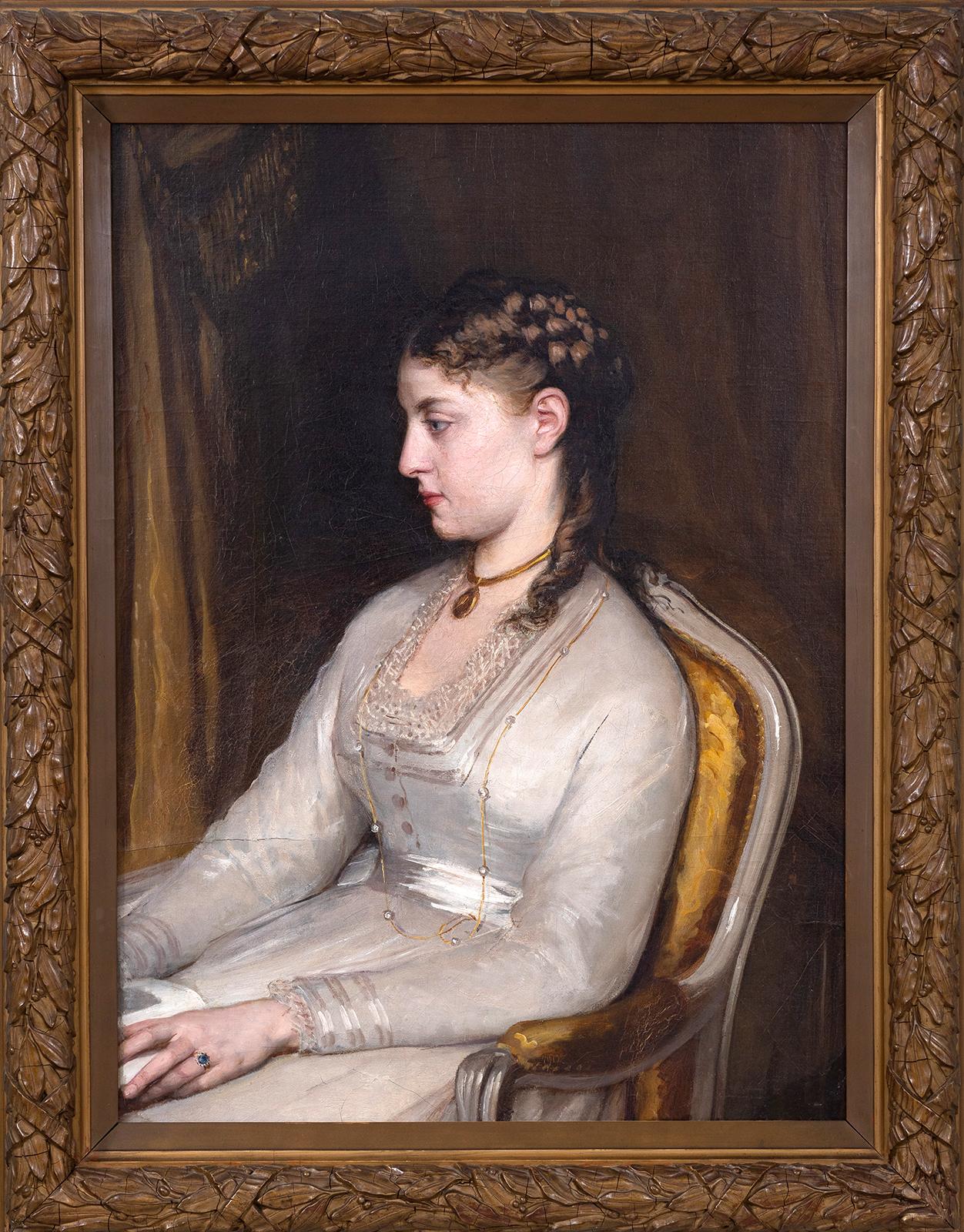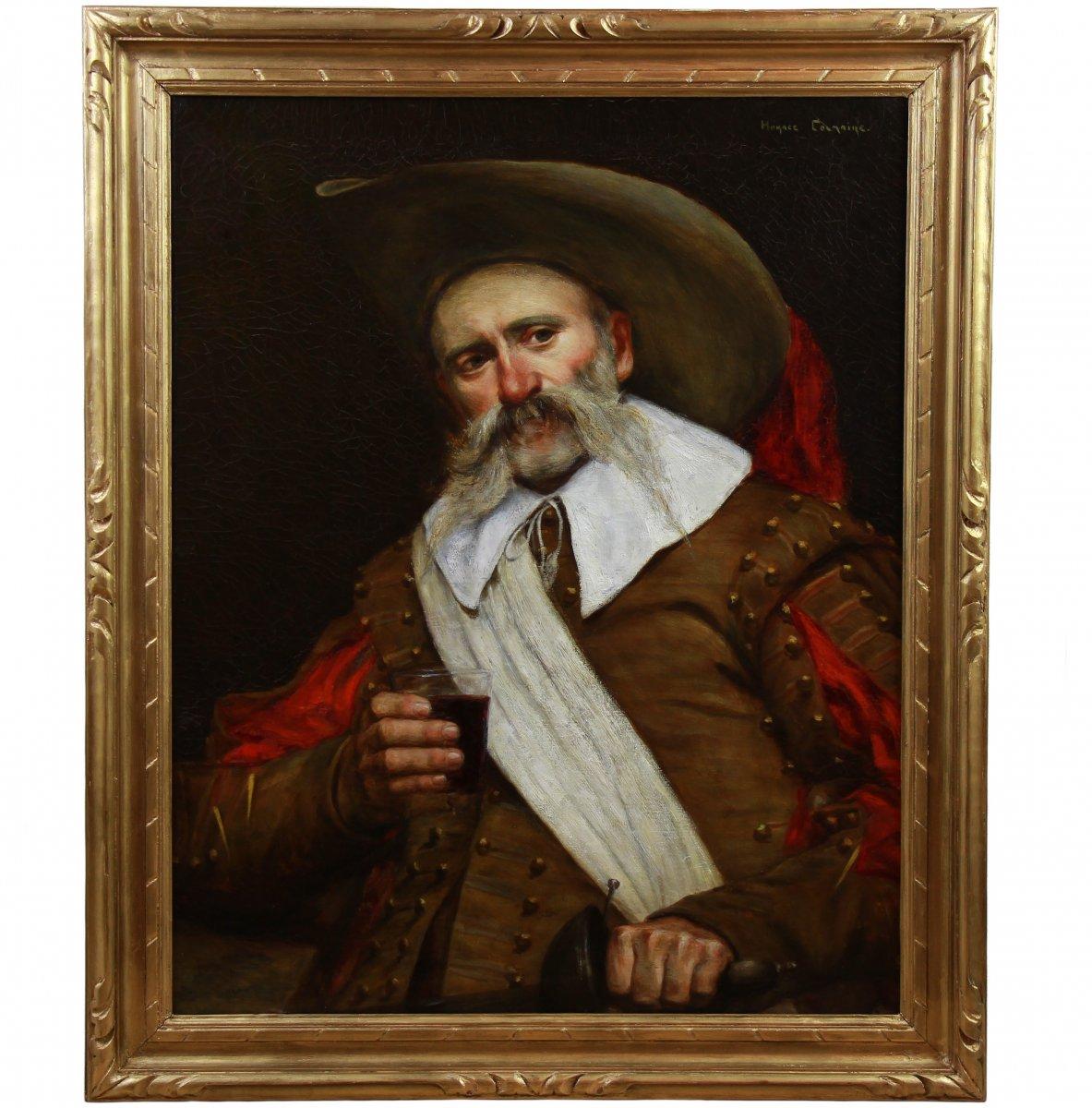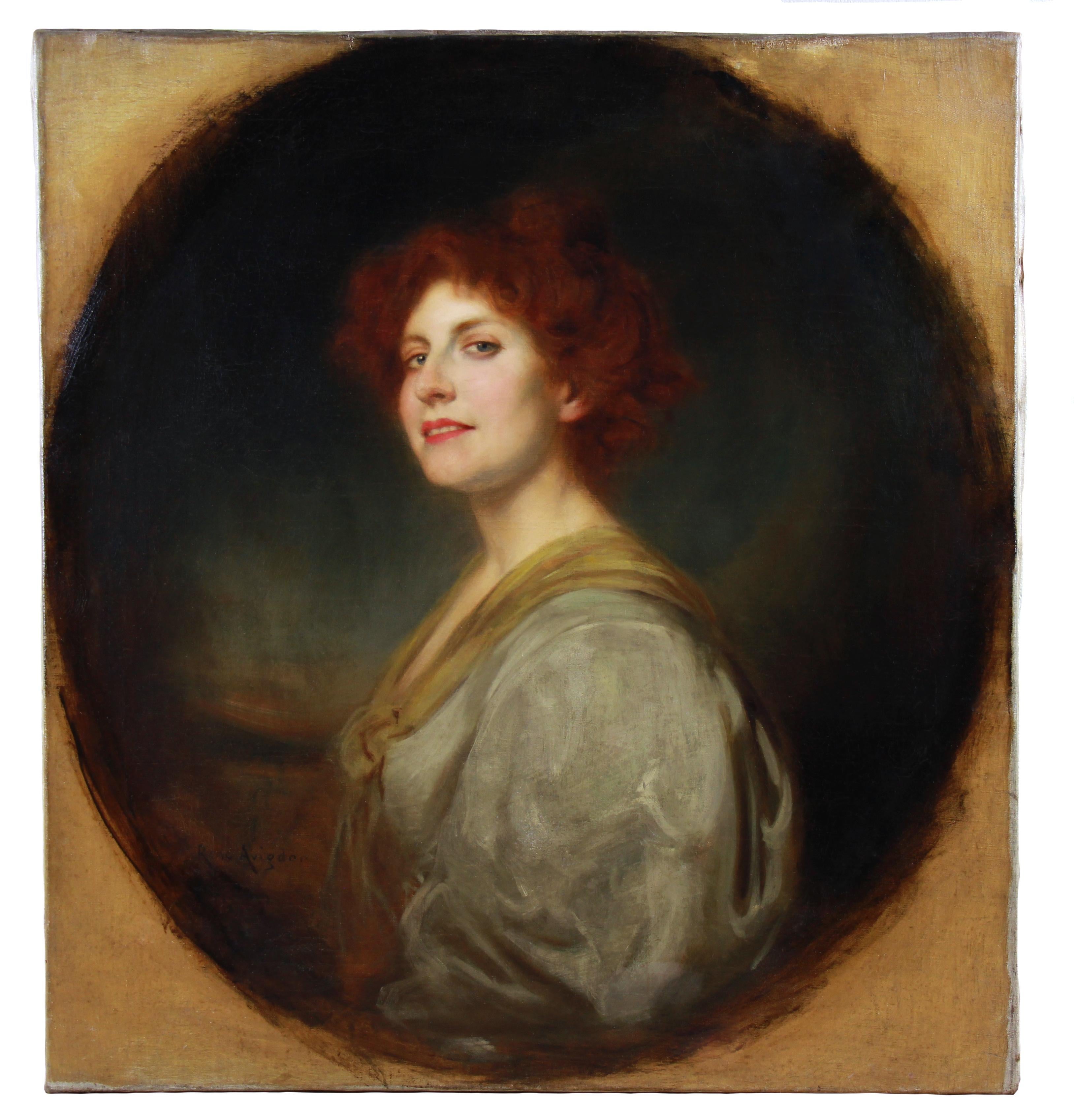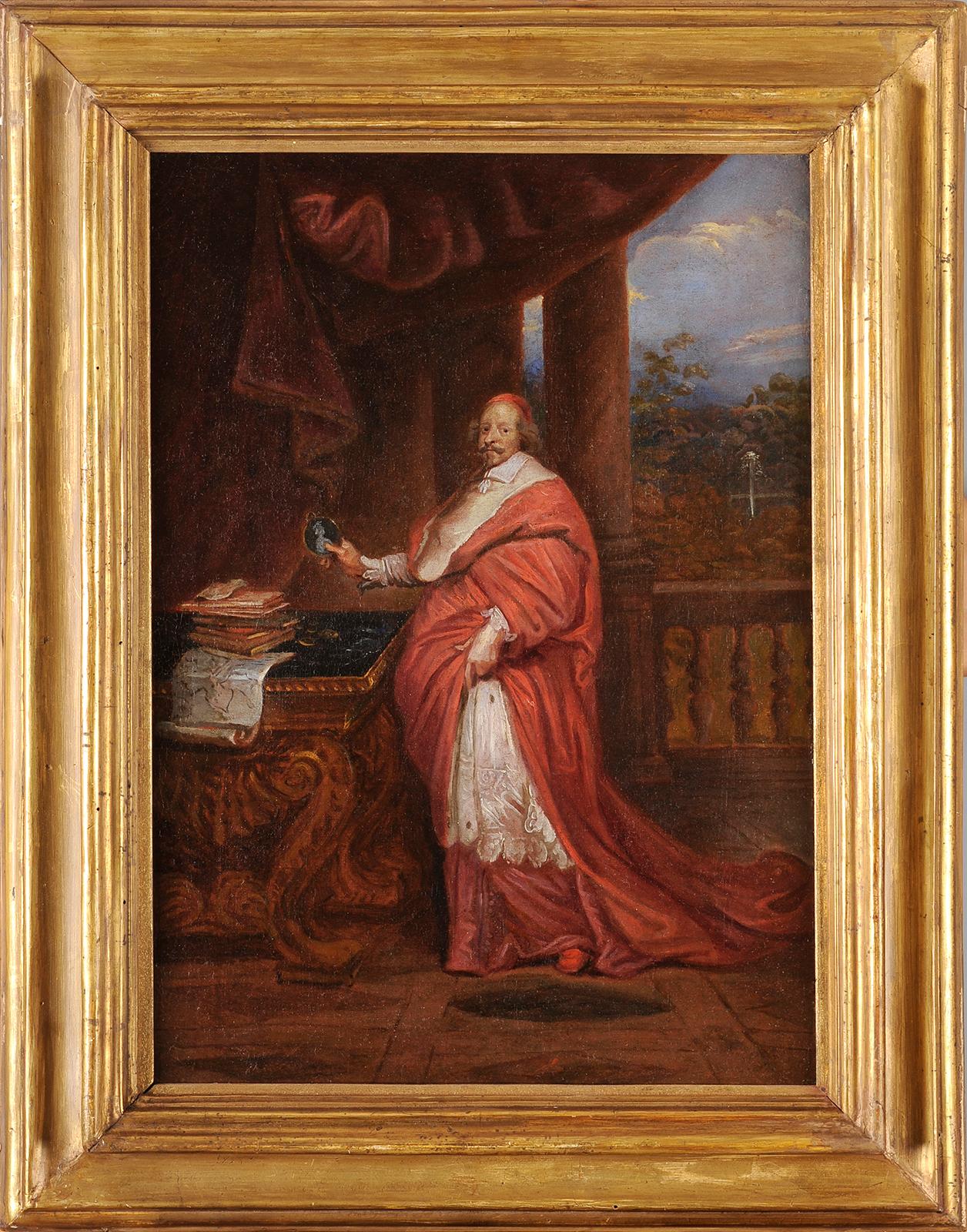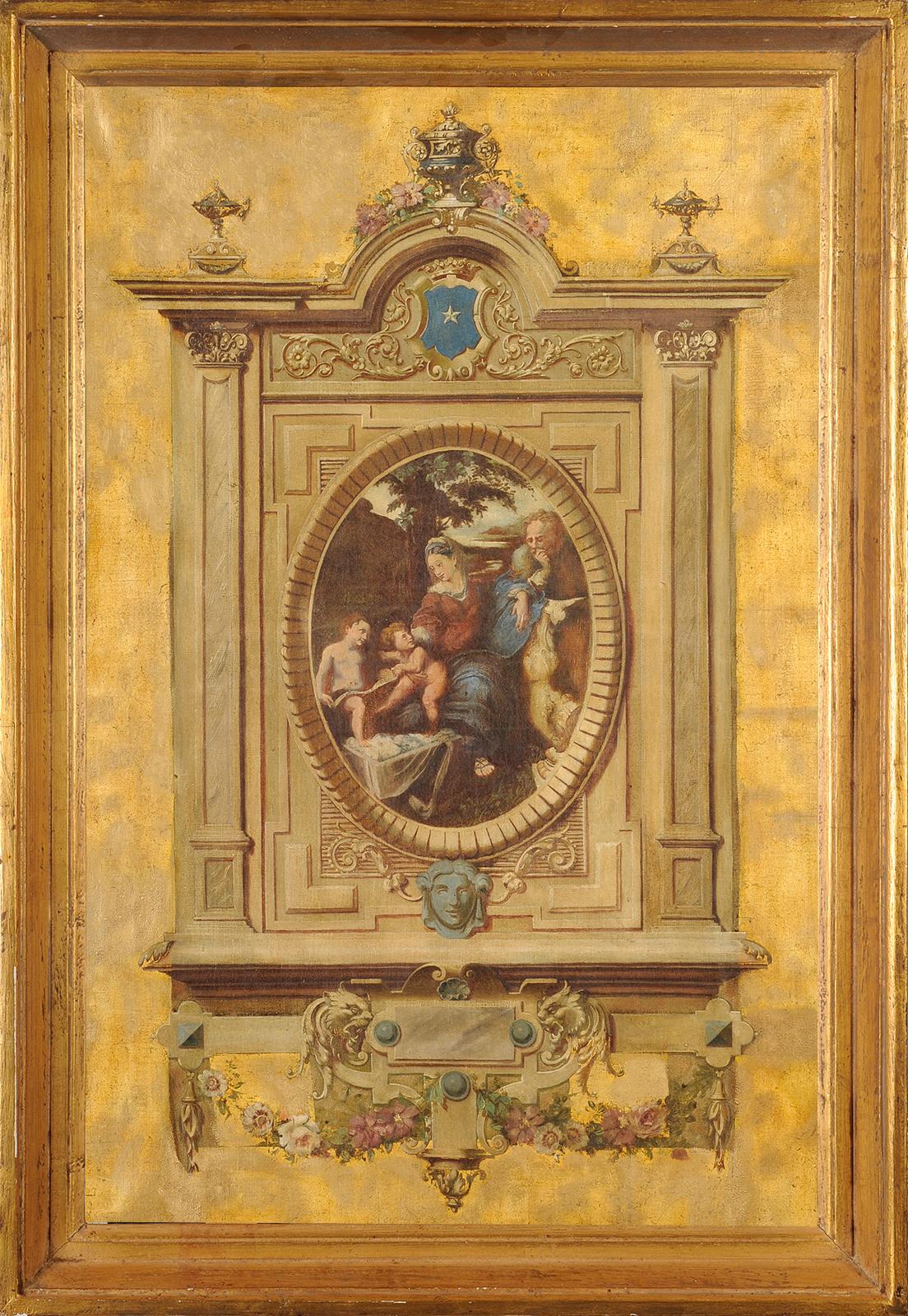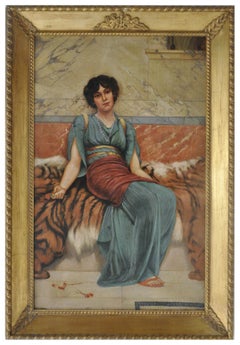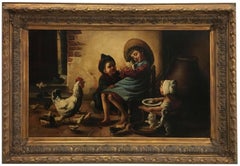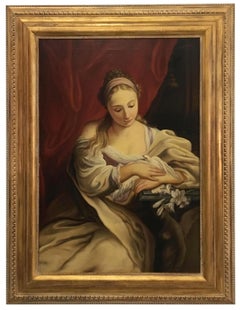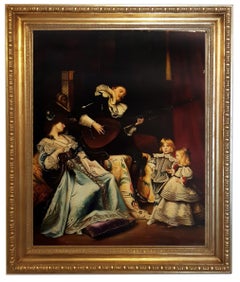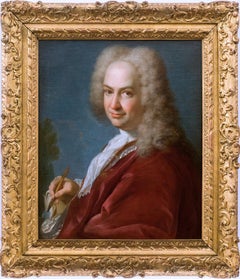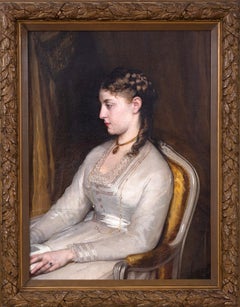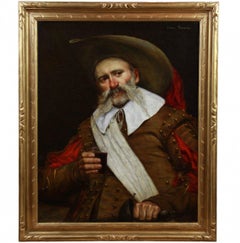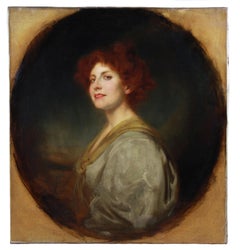Items Similar to SPRING BEAUTY - Angelo Granati - Oirtrair of Oil on Canvas Painting
Want more images or videos?
Request additional images or videos from the seller
1 of 12
Angelo GranatiSPRING BEAUTY - Angelo Granati - Oirtrair of Oil on Canvas Painting2011
2011
About the Item
SPRING BEAUTY - Oil on canvas painting by Angelo Granati, Italy 2011
Gold leaf gilded, pleated silk and mirror wooden frame ext. mis. cm. 164x106.
This is his reinterpretation of painting "Spring Beauty" by gratest old master Corcos Vittorio Matteo.
Master Corcos Vittorio Matteo studied in Florence and Naples. In the 1880s and 1886 he worked in Paris for the well-known art dealer Goupil. He specialized in female portraits. These mainly show women of the European aristocracy, which is why many of her works are found in important private and public collections. This image may also be a portrait.
- Creator:Angelo Granati (1970, Italian)
- Creation Year:2011
- Dimensions:Height: 47.25 in (120 cm)Width: 23.63 in (60 cm)
- Medium:
- Movement & Style:
- Period:
- Framing:Frame IncludedFraming Options Available
- Condition:
- Gallery Location:Napoli, IT
- Reference Number:1stDibs: LU56837844262
About the Seller
4.8
Vetted Professional Seller
Every seller passes strict standards for authenticity and reliability
1stDibs seller since 2017
166 sales on 1stDibs
Typical response time: 6 hours
- ShippingRetrieving quote...Shipping from: Napoli, Italy
- Return Policy
Authenticity Guarantee
In the unlikely event there’s an issue with an item’s authenticity, contact us within 1 year for a full refund. DetailsMoney-Back Guarantee
If your item is not as described, is damaged in transit, or does not arrive, contact us within 7 days for a full refund. Details24-Hour Cancellation
You have a 24-hour grace period in which to reconsider your purchase, with no questions asked.Vetted Professional Sellers
Our world-class sellers must adhere to strict standards for service and quality, maintaining the integrity of our listings.Price-Match Guarantee
If you find that a seller listed the same item for a lower price elsewhere, we’ll match it.Trusted Global Delivery
Our best-in-class carrier network provides specialized shipping options worldwide, including custom delivery.More From This Seller
View AllNEOCLASSICAL FIGURE -In theManner of J. W. Godward Italy Oil on canvas painting
By Eugenio De Blasi
Located in Napoli, IT
Sweet Dreams - Oil on canvas painting, Eugenio De Blasi, Italy, 2011
Gold leaf gilded wooden frame cm. 134x94
The painting by Eugenio De Blasi is inspired by the painting "Sweet Dreams" by John William Godward, a neoclassical Victorian painter...
Category
2010s English School Figurative Paintings
Materials
Canvas, Oil
INSIDE SCENE- Belgian School - Italian figurative oil on canvas painting
By Eugenio De Blasi
Located in Napoli, IT
INSIDE SCENE - Oil on canvas painting, Eugenio De Blasi, Italy, 2005
Gold leaf gilded wooden grame cm. 90X130
The painting by Eugenio De Blasi is inspired by the work of David Tenier...
Category
Early 2000s Flemish School Figurative Paintings
Materials
Canvas, Oil
PORTRAIT OF YOUNG WOMAN - Venetian School -Italian oil on canvas painting
By Eugenio De Blasi
Located in Napoli, IT
PORTRAIT OF YOUNG WOMAN - Oil on canvas painting cm.95x65, Eugenio De Blasi, Italy, 2008
The painting by Eugenio De Blasi is inspired by the work of the Venetian painter and portrai...
Category
Early 2000s Italian School Figurative Paintings
Materials
Canvas, Oil
SCENE WITH MINSTREL- Eugenio De Blasi - Italy -Oil on canvas painting
By Eugenio De Blasi
Located in Napoli, IT
Scene with Minstrel - Oil on canvas painting, Eugenio De Blasi, Italy, 2005
This is his reinterpretation of a greatest old master painting by Giovanni Boldini.
Category
Early 2000s Italian School Figurative Paintings
Materials
Canvas, Oil
PORTRAIT OF UGO FOSCOLO - Antonio Jannone - Italian Oil On Canvas Painting
By ANTONIO JANNONE
Located in Napoli, IT
PORTRAIT OF UGO FOSCOLO - Oil on canvas cm.50x40, Antonio Jannone, Italy, 2002.
this beautiful portrait of the Italian poet Ugo Foscolo is the painter's pe...
Category
Early 2000s Old Masters Portrait Paintings
Materials
Canvas, Oil
ALLEGORICAL SCENE - Giovanni Faliero - Italy Oil on Canvas Painting
By Giovanni Faliero
Located in Napoli, IT
Allegorical Scene - Giovanni Faliero Italia 2009 - Oil on canvas cm. 90x110.
Gold leaf gilded wooden frame available on request
This beautiful oil on canvas is the personal reinterpretation of the magnificent painting “Bacchant playing the Cymbals” by Jean-Simon Berthélemy, a French painter of the 18th century. Here we admire a mythological scene showing a naked bacchant playing cymbals next to a wooded stream, with a small sleeping faun...
Category
Early 2000s Old Masters Portrait Paintings
Materials
Canvas, Oil
You May Also Like
Presumed artist self-portrait
Located in BELEYMAS, FR
Louis-Gabriel BLANCHET
(Versailles, 1701 – Rome, 1772)
Presumed self-portrait of the artist
Oil on canvas
H. 73 cm; W. 60 cm
Circa 1730
Originally presented in a Restoration period frame with a "Mignard" cartouche, this beautiful painting initially appeared to us as a work from northern Italy. However, it exuded a rather French form of refinement, suggesting that its artist may have assimilated a dual influence from both sides of the Alps.
We thank our colleague and friend Philippe Mendès for spontaneously and judiciously "bringing out" the name of Louis-Gabriel Blanchet, a Romanized French portraitist, whose spirit and stylistic characteristics we clearly recognize here.
Blanchet's "French" years, before his final departure for Rome in 1728, following his winning of the second Grand Prix for painting after Subleyras in 1727, are extremely poorly documented. His father, Gabriel, was valet to Blouin, himself Louis XIV's first valet at the time. According to Thierry Lefrançois, Blanchet was one of the few students of Nicolas Bertin (1667-1736), whose studio he is said to have joined in the early 1720s. At a baptism on March 24, 1724, where he was godfather, he is mentioned as a painter in the picture store of the Duke of Antin, the director of buildings between 1708 and 1736. At this time, he was probably already married to Jeanne Quément, with whom he had a daughter also named Jeanne, who would marry Nicolas Aviet, the son of a valet in the queen's wardrobe, in Versailles in 1738.
When Blanchet arrived in Rome in October 1728, he was accompanied by Subleyras, Trémolières, and Slodtz. He enjoyed the goodwill of Vleughels, the director of the Académie de France, which had been based at the Palazzo Mancini since 1725, even though the latter was not always kind to our resident. From 1732, he was under the protection of the Duke of Saint-Aignan when he took up his post as ambassador to Rome. Along with Slodtz and Subleyras, they formed a trio of friends, joined by Joseph Vernet shortly after his arrival in Rome in 1734. Slodtz and Blanchet, on the occasion of Subleyras's marriage in 1739, were there to attest that their friend was not bound by any marital commitment, and Blanchet was a witness at Vernet's wedding in 1745.
It is most likely from these early years in Rome that our portrait of the artist dates, the expression and turn of his face irresistibly reminiscent of a self-portrait. The still relatively youthful features may correspond to Blanchet's thirty-something years, and the fluffy wig was still fashionable at this time.
The painting fits well with the depiction of a young painter wanting to display both the beginnings of success and a certain simplicity or restraint. A slight smile expresses a form of assurance in this man with a gentle, sincere gaze and a face radiating a keen sense of wit. We find here the air of intimacy present in almost all of Blanchet's portraits, even those from the 1750s and 1760s, as well as an almost complicity with the viewer. The spirit of the painting is quite close to that of the presumed portrait of Bouchardon (painted around 1730) and the portrait of Pannini, painted in 1736, but it possesses a more natural quality, notably thanks to the absence of decorum. Our work exhibits the characteristics of Blanchet's paintings: elegance, luminosity (especially in the whites), vibrant and refined colors (here, the harmony of the garnet of the garment and the slate blue of the background, whose uniformity is tempered by a very sketched landscape and a grove of greenery), light complexions, rather rosy cheekbones, often full lips, and rather tight framing.
According to the Academy's rules, Blanchet's stay should have ended in the spring of 1732, but, for reasons unknown, he remained in the Eternal City until his death, as did his friend Subleyras, with whom he shared accommodation until the late 1730s. The latter regularly called upon him to collaborate on his paintings, such as The Meal at Simon's. Through Saint-Aignan's intervention, Blanchet was employed in the late 1730s by the Stuart princely family, then exiled in Italy. He notably produced copies (now lost) after Liotard of the portraits of Charles Edward and Henry Benedict, the sons of James III Stuart. The latter also commissioned three other portraits (now in the National Portrait Gallery in London), whose more formal character contrasts with the intimate spirit of Blanchet's portraits. Blanchet frequented English painters, such as the landscape painter Richard Wilson, and studied with the Scottish portraitist Katherine Read...
Category
1730s French School Portrait Paintings
Materials
Oil, Canvas
Portrait of young women reading
Located in BELEYMAS, FR
French school circa 1880
Young woman reading
Oil on canvas
H. 86 cm; W. 64 cm
Category
1880s French School Portrait Paintings
Materials
Canvas, Oil
Oil On Canvas, portrait of a musketeer French school 20th century
Located in Gavere, BE
Oil On Canvas, portrait of a musketeer French school 20th century
Horace Colmaire studied with Albert Roze in Amiens before joining the workshops of Léon Bonnat, Jules Adler and Ray...
Category
1920s French School Portrait Paintings
Materials
Gold Leaf
Red-haired beauty portrait oil painting on canvas by René Avigdor 19Th Century
Located in Gavere, BE
Red-haired beauty portrait oil painting on canvas by René Avigdor 19Th Century
Rene Avigdor was born in Nice and spent his career in France.
He specialized in portraits, especiall...
Category
1890s French School Portrait Paintings
Materials
Gold Leaf
$10,613 Sale Price
20% Off
Free Shipping
Cardinal Mazarin portrait
Located in BELEYMAS, FR
French School circa 1645
Portrait of Cardinal Mazarin - Sketch
Oil on canvas
H. 41.5 cm; W. 27 cm
Provenance: Collection of the Reverend Georges Downing Bowles (1789-1863)
Would ...
Category
1640s French School Portrait Paintings
Materials
Canvas, Oil
Holy family under an oak tree on a gold background
Located in BELEYMAS, FR
French school circa 1870
Holy Family under an oak, after Raphaël, on gold background
Oil on canvas
H. 92 cm; W. 60 cm
This aesthetic curiosity takes up the very famous composition b...
Category
19th Century French School Portrait Paintings
Materials
Canvas, Oil
Recently Viewed
View AllMore Ways To Browse
Vittorio Corcos
Vittorio Matteo Corcos
Art Deco Posters Lithographs
Fontana Lucio
Japan Sketches
Photography Elton John
Portrait Of An Officer
Salvador Dali Watercolor
San Francisco Vintage Photos
Vintage Photography 1920
Vintage Soviet Posters
Vintage Train Print
African Woman Portrait Painting
Clay Face
Colorful Pop Art Sculpture
Mathematical Sculptures
Naked Women Art
Old Retro Black And White Photos
